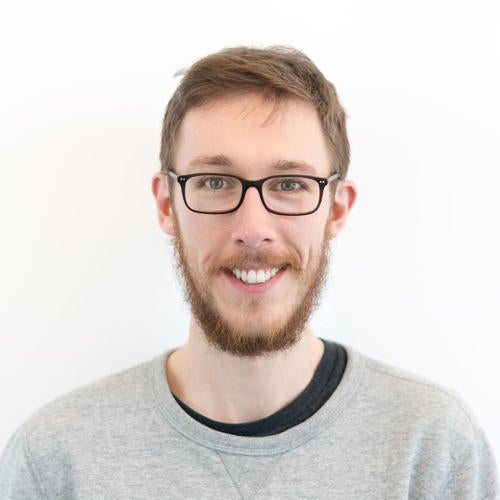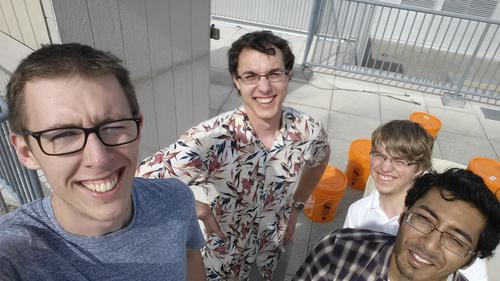 We are pleased to have Tim Leshuk as our very first graduate student interviewee! We recently caught up with him to see what he's working on and to get some advice he has for other grad students. Thanks Tim!
We are pleased to have Tim Leshuk as our very first graduate student interviewee! We recently caught up with him to see what he's working on and to get some advice he has for other grad students. Thanks Tim!
What program are you in and when did you start it?
My program is Ph.D. in Chemical Engineering (Nanotechnology), which I started in 2013.
When did you know that you wanted to do graduate school?
I had done a number of research co-op work terms during my undergrad, so I knew research was something I enjoyed, and it was probably around the end of the 3rd year of my undergrad program that I made up my mind to go to grad school.
How did you find your supervisor?
My supervisor is Prof. Frank Gu, who I met in 2009 when interviewing for my first co-op job. Like most bright-eyed UW Nano Engineering undergrads at the time, I wanted to "cure cancer” and/or save the world, and Prof. Gu was the cancer nanomedicine star fresh out of MIT, so I was very interested to work under him.
What is your research on?
My research at the moment is on developing nano materials for water treatment, specifically recyclable materials to treat organic water contaminants, and even more specifically, photocatalytic nanocomposites for degrading naphthenic acids, the principal toxicant in oil sands wastewater.
How did you become interested in your research?
Over a few terms of working with Prof. Gu in my undergrad, I was becoming increasingly interested in nanomaterials (and simultaneously less so in biomedical research). Right around that time Dr. Gu pitched me a really persuasive argument on the environmental and public health benefits of water treatment (e.g., preventing cancers from forming in the first place, rather than treating them through therapeutic means), and application of nanotechnology to environmental remediation seemed to be relatively under-developed at the time, and so a good field for research. He also gave me the fantastic opportunity to independently lead a research project in this direction, which was exactly what I was interested in at the time, and also aligned well with my interest to explore more materials-based research.
What is the coolest thing about your research?
One cool thing about my research is that the particles we have developed enable a completely passive (zero chemical or electricity input) water treatment platform for extremely persistent pollutants like naphthenic acids. This happens to be a great fit for an industry like Canada’s oil sands, who have a massive inventory of water requiring treatment, but where any treatment solution has to have extremely minimal operating costs. It’s also mind-bending to me on a regular basis to think about application of my research in nanotechnology (10^-9 scale) to the largest water treatment challenge on the planet today (10^12 L).
Tell us something we might not know (related to your research)?
Fun fact: the redox potential of valence band holes in TiO2 is more than double that of Cl2, which is why photocatalysis can treat a wider range of pollutants and degrade them more completely than conventional water chlorination.
Do you have an image demonstrating your research that you would like to share?
Here is a picture of (from left-to-right) me, Stuart Linley, Cullen Tielemans, and Harish Krishnakumar (all Gu lab grad students, apart from Cullen, who is finishing up his BASc). It seems like every summer we do a ~500 L treatment of oil sands wastewater using natural sunlight. So this is the 4 of us after a particularly sweaty day of hauling ~250 L of water up 4 flights of stairs to the EIT rooftop (which was the most secluded but sunniest spot we could arrange at the time).

Why did you choose UW for graduate school?
I chose UW because of its excellence in both nanotechnology (via WIN) and water (via the Water Institute) - I think UW is one of the best schools in Canada for environmental nanotechnology research.
What advice do you have for current graduate students?
Don’t get distracted by research red herrings. I once spent a year on a project pursuing a very mechanistic investigation into some data that didn’t make sense, but answering each question seemed to raise two more, so after fully following that rabbit hole, I had a paper, but rather low impact. Would have been much more profitable to devote that time to a well-planned engineering or materials-development study, and I should have realized earlier that even if I fully answered all the scientific questions along that direction, the best-case novelty of the conclusions was not worthwhile in the grand scheme of things. Other lesson I learned - maximize measurable outcomes of all your work, even (especially) the low impact research. If it looks like a research direction isn’t promising any more, rather than just killing a few months of work to try a new approach, try to spin out that work to some form of publication - even a low-impact publication looks better on your CV than a few months of work with zero to show for it.
What advice do you have for potential graduate students?
You are going to have waaay smoother sailing and earn your degree much more quickly by plugging into an ongoing project (or branching a lab’s expertise in a new direction) rather than forging your own path. Doing completely new stuff (within the context of your lab group) is hard - being able to learn from and be trained by current grad students will save you so much grief. Also make friends with and collaborate with as many people in your lab (and other departments) as you can! I’ve found the most creative ideas come when projects collide, and can be relatively easy for all parties (each bringing some expertise that is trivial for them, but would take the other group years to develop in-house).
What's a personal challenge you've faced as a graduate student?
Work-life balance. Still don’t know if I’ve figured it out.
What's a career-related challenge you've faced as a graduate student?
Founding a start-up (H2nanO) mid-grad school. For the entrepreneurially-minded WIN grad students, my advice is to finish your degree first, then start a company. Difficult to focus on two things simultaneously that have very conflicting work-styles and priorities.
What is your favourite thing about Waterloo?
Probably all the great people I know.
What do you like to do when you're not doing research?
I enjoy reading, board games. Picked up rock climbing within the last year.
Is there anything else you would like to add?
Thank you WINGSS (and all my fellow nano grad students) for helping to make the QNC and UW a great place to work and study!




